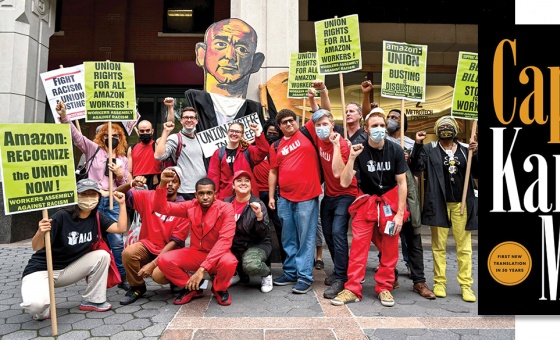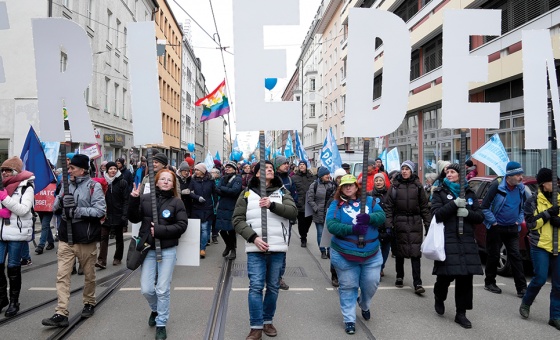This is the last article you can read this month
You can read more article this month
You can read more articles this month
Sorry your limit is up for this month
Reset on:
Please help support the Morning Star by subscribing here
THE United Nations has called for an end to impunity for police who violate the human rights of black people in a landmark race report.
The families of black people killed in custody called for greater accountability from police following today’s publication of the report, which urges countries worldwide to take concrete action against discrimination, violence and systemic racism.
Launched in the aftermath of the murder of George Floyd in the US last year, it specifically calls on UN member states – including Britain – to end “impunity” for police officers’ abuses.
Analysing 190 deaths around the world, the UN Human Rights Commission found that police officers are rarely held accountable for killing black people, due in part to deficient investigations and an unwillingness to acknowledge the impact of structural racism.
The commission heard from the families of those killed in police custody, including Wendy Clarke, whose son Kevin Clarke died after the inappropriate use of restraints by the Met Police.
Warnings from Mr Clarke, who had paranoid schizophrenia, that he could not breathe were likely heard by the officers involved in the incident, an inquest found last year.
Ms Clarke said: “We want to see accountability and real change, not just in training, but the perception and response to black people by the police and other services.
“We want mental health services better funded so the first point of response is not just reliant on the police.”
Marcia Rigg, whose brother Sean Rigg died of cardiac arrest in a Brixton police station in 2008, said she was struck by the similar experiences of those consulted by the commission, including the family of slain US medic Breonna Taylor and the brother of Mr Floyd.
Ms Rigg, whose brother also had paranoid schizophrenia, said she hoped the report would reignite longstanding calls for systemic change in Britain and that the government responds.
“It’s been happening here for decades,” she said. “There are many George Floyds here, before George Floyd and after George Floyd, including my personal experience and what happened to my brother.”
Stand Up To Racism co-convener Weyman Bennett said the report stands in stark contrast to the Tories’ recent denial that structural racism exists in Britain.
“Their strategy of divide-and-rule and culture wars has been exposed,” he said.
“The shocking level of violence against black communities shows that the racism is systemic and demands a real response.
“But we’ll only get that if the trade union and social movements unite together to fight for that.”
Deborah Coles, director of legal charity Inquest, said the report has confronted the Tories with evidence of systemic racism.
“The disproportionate number of black men who die after the use of lethal force and neglect by the state is at the sharp end of a continuum of violence and racism,” she said.
“There is a pattern of systemic racism in our policing and criminal justice system.”
UN human rights chief Michelle Bachelet, who issued the report, branded the status quo “untenable” and called on all states to “stop denying and start dismantling racism.”
“Systemic racism needs a systemic response,” she said. “There needs to be a comprehensive rather than a piecemeal approach to dismantling systems entrenched in centuries of discrimination and violence.”
Ms Bachelet said that financial reparations alone were not enough but should be part of an array of measures including restitution, rehabilitation, acknowledgement of injustices, apologies, memorialisation and educational reforms.
She hailed the efforts of advocacy groups such as Black Lives Matter, which she said have helped to provide “grassroots leadership through listening to communities” and should receive “funding, public recognition and support.”
The UN commissioned the report during a special session last year following the killing of Mr Floyd, a black American who was murdered by a white police officer in Minneapolis last May.
Derek Chauvin was sentenced to 22-and-a-half years in prison last week after being found guilty of Mr Floyd’s murder.
The report lays out case studies and the broader situation in about 60 countries including Belgium, Brazil, Canada, Colombia and France.
People of African descent face inequalities and marginalisation in many countries, the report says, including unfair access to education, healthcare, jobs, housing and clean water.
Mona Rishmawi, who leads the commission’s non-discrimination branch, said: “We could not find a single example of a state that has fully reckoned with the past or comprehensively accounted for the impacts of the lives of people of African descent today.
“Our message, therefore, is that this situation is untenable.”
Ms Rishmawi said the commission found that “a main part of the problem is that many people believe the misconceptions that the abolition of slavery, the end of the transatlantic trade and colonialism have removed the racially discriminatory structures built by those practices.”
She added that the report “only touched the tip of the iceberg” and that more work was needed.












